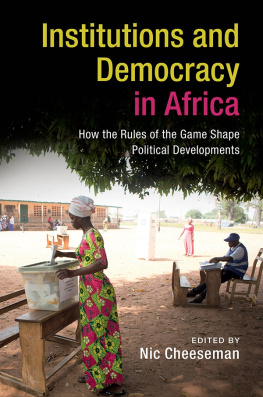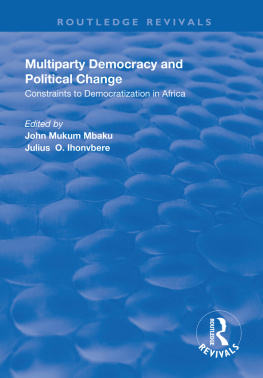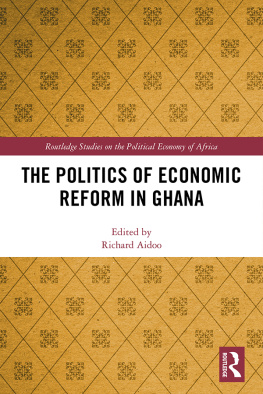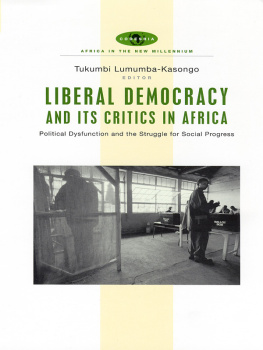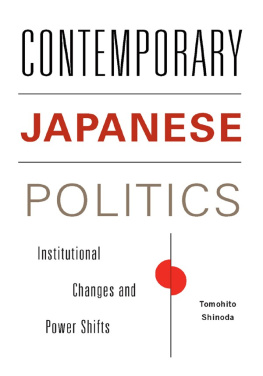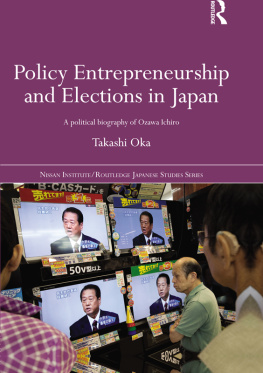Historically, African political institutions such as constitutions, legislatures and judiciaries have been seen as weak and vulnerable to manipulation, leading some to claim that the continent is institutionless. However, recent developments including the consolidation of presidential term limits in a number of countries demonstrate that this depiction is no longer tenable. By drawing attention to how institutions can shape the practice of politics, this book demonstrates that electoral commissions, economic regulations, and systems of land tenure are vital to our understanding of contemporary Africa.
A series of cutting-edge contributions from leading scholars explain how the rules of the game shape political developments across the continent, from Kenya to Nigeria and from Benin to South Africa. In chapters that cover bureaucracies, constitutions, elections, political parties, the police and more, the authors argue that a new research agenda is required if we are to better understand the process of democratisation.
Nic Cheeseman is Professor of Democracy at the University of Birmingham and was formerly Director of the African Studies Centre at Oxford University. He is the recipient of the GIGA award for the best article in Comparative Area Studies (2013) and the Frank Cass Award for the best article in Democratization (2015). He is also the author of Democracy in Africa: Successes, failures and the struggle for political reform (Cambridge University Press, 2015), the founding editor of the Oxford Encyclopaedia of African Politics , a former editor of the journal African Affairs , and an advisor to, and writer for, Kofi Annans African Progress Panel.
University Printing House, Cambridge CB2 8BS, United Kingdom
One Liberty Plaza, 20th Floor, New York, NY 10006, USA
477 Williamstown Road, Port Melbourne, VIC 3207, Australia
314321, 3rd Floor, Plot 3, Splendor Forum, Jasola District Centre, New Delhi 110025, India
79 Anson Road, #0604/06, Singapore 079906
Cambridge University Press is part of the University of Cambridge.
It furthers the Universitys mission by disseminating knowledge in the pursuit of education, learning, and research at the highest international levels of excellence.
www.cambridge.org
Information on this title: www.cambridge.org/9781107148246
DOI: 10.1017/9781316562888
Cambridge University Press 2018
This publication is in copyright. Subject to statutory exception and to the provisions of relevant collective licensing agreements, no reproduction of any part may take place without the written permission of Cambridge University Press.
First published 2018
Printed in the United Kingdom by Clays, St Ives plc
A catalogue record for this publication is available from the British Library.
Library of Congress Cataloging-in-Publication Data
Names: Cheeseman, Nicholas, 1979 editor.
Title: Institutions and democracy in Africa : how the rules of the game shape political developments / Edited by Nic Cheeseman.
Description: New York, NY : Cambridge University Press, 2017. | Includes bibliographical references and index.
Identifiers: LCCN 2017044887 | ISBN 9781107148246 (alk. paper)
Subjects: LCSH: Africa Politics and government 21st century. | Political culture Africa. | Democracy Africa.
Classification: LCC JQ1875 .I55 2017 | DDC 320.96dc23
LC record available at https://lccn.loc.gov/2017044887
ISBN 978-1-107-14824-6 Hardback
ISBN 978-1-316-60255-3 Paperback
Cambridge University Press has no responsibility for the persistence or accuracy of URLs for external or third-party internet websites referred to in this publication and does not guarantee that any content on such websites is, or will remain, accurate or appropriate.
This book is dedicated to Nigel Bowles, who was one of the first people to teach me about political institutions, and what it is to be an academic, and whose lessons guide me still.
I would also like to thank Claire Elder, Senior Associate Editor for this project, whose dedication, intelligence and attention to detail were essential to both the quality and punctuality of this volume.
Contents
Nic Cheeseman
Rachel Beatty Riedl
Catherine Boone
Leonardo R. Arriola
Muna Ndulo
Peace A. Medie
M. Anne Pitcher and Manuel P. Teodoro
Ian Cooper
Carolien van Ham and Staffan I. Lindberg
Brian Klaas
Daniel N. Posner and Daniel J. Young
Michaela Collord
Peter VonDoepp
Alex Dyzenhaus
Nic Cheeseman
Figures
Tables
Contributors
Leonardo R. Arriola is Associate Professor of Political Science and Director of the Center for African Studies at the University of California, Berkeley. His research focuses on democratic politics and political violence in developing countries. He is the author of Multiethnic Coalitions in Africa: Business Financing of Opposition Election Campaigns (Cambridge University Press, 2012). His work has been published in journals such as the American Journal of Political Science, Comparative Political Studies and World Politics . He currently serves on the editorial boards of African Affairs, Comparative Politics and Comparative Political Studies .
Catherine Boone is Professor of Comparative Politics at the London School of Economics and Political Science. Her research focuses on African political economy and state-building. She is the author of Property and Political Order in Africa: Land Rights and the Structure of Politics (Cambridge University Press, 2014), Political Topographies of the African State (Cambridge University Press, 2003) and Merchant Capital and the Roots of State Power in Senegal (Cambridge University Press, 1993). She chairs the Political Economy Section of the American Political Science Association (APSA), is a long-standing member of APSAs Africa Initiative and is past-president of the West African Research Association.
Nic Cheeseman is Professor of Democracy at the University of Birmingham and was formerly Director of the African Studies Centre at Oxford University. He is the recipient of the GIGA award for the best article in Comparative Area Studies (2013) and the Frank Cass Award for the best article in Democratization (2015). He is also the author of Democracy in Africa: Successes, failures and the struggle for political reform (Cambridge University Press, 2015), the founding editor of the Oxford Encyclopaedia of African Politics , a former editor of the journal African Affairs , and an advisor to, and writer for, Kofi Annans African Progress Panel.
Michaela Collord is a DPhil candidate at the University of Oxford. Her doctoral research examines dominant party politics and legislative institutional change with a primary focus on Uganda and Tanzania.
Ian Cooper is Teaching Associate in Comparative Politics at Cambridge University. His research focuses on democratisation and electoral politics in southern Africa, with a particular focus on party motivation, internal party democracy and ethnic mobilisation. He has published articles in Democratisation, Transformation and the Journal of Southern African Studies .

